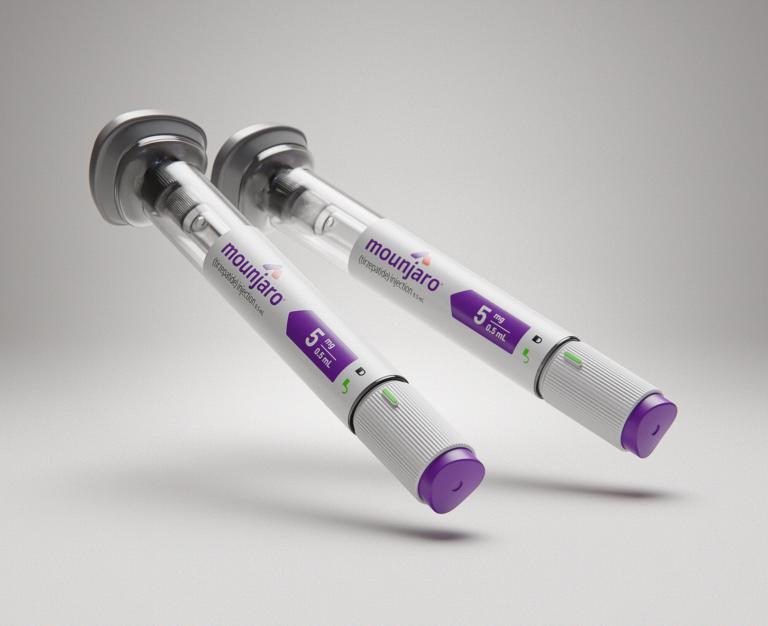
When it comes to managing weight and controlling blood sugar levels in patients with type 2 diabetes, two prescription brand-name medications have gained attention: Mounjaro and Ozempic. While both medications have shown promise in helping individuals achieve their health goals, it is important to understand their similarities and differences to make an informed decision. This article will provide an in-depth comparison of Mounjaro vs. Ozempic, exploring their effectiveness for weight loss and blood sugar control.
Mounjaro: A novel approach to weight loss
Mounjaro is a prescription medication developed by Eli Lilly that has shown significant potential for weight loss. It is a dual-acting GIP (glucose-dependent insulinotropic polypeptide) and GLP-1 (glucagon-like peptide-1) receptor agonist. These hormones play crucial roles in regulating blood sugar levels and appetite.
In clinical trials evaluating Mounjaro’s use for weight management, it has demonstrated the highest amount of weight loss compared to other medications. At the highest dose, Mounjaro has led to weight loss of about 21% to 22.5%. Some clinicians have noted that these numbers approach the weight loss seen with bariatric surgery.
It is important to note that Mounjaro is not yet specifically approved by the FDA (Food and Drug Administration) for weight loss. However, in October 2022, the FDA granted Mounjaro fast-track designation for the treatment of adults with obesity or overweight individuals with weight-related medical conditions. The New Drug Application for Mounjaro’s approval for chronic weight management is expected to be fully reviewed by the FDA in 2023.
Ozempic: A proven option for weight reduction and blood sugar control
Ozempic, developed by Novo Nordisk, is a GLP-1 receptor agonist that has been approved by the FDA for both blood glucose control and weight management. It works by binding to GLP-1 receptors and stimulating insulin release from the pancreas when needed. Additionally, it slows down the digestion process (called gastric emptying), improves satiety and reduces food intake.
In clinical trials, Ozempic has shown consistent weight loss results. Adults with type 2 diabetes who used Ozempic experienced an average weight loss of about 6% to 7%. This weight loss can have a significant impact on overall health and can help individuals achieve their weight loss goals.
Furthermore, Ozempic has been shown to effectively lower blood sugar levels in patients with type 2 diabetes. It can lead to significant reductions in A1C levels, a key indicator of long-term blood sugar control. By incorporating Ozempic into their diabetes management plan, individuals can better manage their blood sugar levels and reduce their risk of complications associated with diabetes.
Similarities and differences between Mounjaro and Ozempic
Although Mounjaro and Ozempic share the common goal of weight loss and blood sugar control, there are some notable differences between the two medications.
Mechanism of action
One major difference between Mounjaro and Ozempic lies in their mechanism of action. Mounjaro acts on both GIP and GLP-1 receptors, while Ozempic specifically targets GLP-1 receptors. This distinction means that Mounjaro has a dual effect on regulating blood sugar levels and appetite, potentially leading to more significant weight loss.
Active ingredients
Mounjaro and Ozempic are both in the class of drugs known as incretin mimetics but have some differences.
Mounjaro contains tirzepatide, which mimics the effects of both GLP-1 and GIP. It is known as a dual GIP and GLP-1 receptor agonist or a ‘twincretin’ medication. By targeting both the GIP and GLP-1 receptors, tirzepatide aims to provide enhanced glycemic control compared to Ozempic, which only targets one of these receptors.
Ozempic uses semaglutide as its active ingredient, which mimics the effects of GLP-1. It is a GLP-1 receptor agonist.
Administration
Both Mounjaro and Ozempic are administered as a subcutaneous weekly injection (injection under the skin). Mounjaro is available in doses of 2.5 mg, 5 mg, 10 mg, and 15 mg, with the recommended starting dose being 2.5 mg once weekly. On the other hand, Ozempic is available in doses of 0.25 mg and 0.5 mg, with the recommended starting dose being 0.25 mg once weekly.
FDA approval
While Ozempic has received FDA approval for both blood sugar control and weight management in patients with type 2 diabetes, However, if weight loss is your only goal, the brand of semaglutide known as Wegovy given at a higher dose is approved for weight loss (but not blood sugar control in type 2 diabetes).
Mounjaro has not yet received FDA approval specifically for weight loss and is currently approved as a diabetes medication only. However, ongoing studies and the FDA’s fast-track designation indicate the potential for Mounjaro’s future approval as a weight-loss medication.
Ozempic is also approved to lower the risk of a major cardiovascular event (like a heart attack or stroke) in patients with type 2 diabetes. Mounjaro has not yet received this indication.
Weight loss potential
Although both Mounjaro and Ozempic have been associated with weight loss, neither medication is FDA-approved specifically for this purpose. However, they may be used off-label for weight loss in individuals who are overweight to improve health outcomes.
Mounjaro has shown promising results in terms of weight loss in clinical trials. In a Phase 2 trial, patients treated with Mounjaro achieved significant weight loss compared to placebo, with some patients losing over 20% of their body weight.
Ozempic has also demonstrated weight loss benefits. In a Phase 2 trial, patients treated with Ozempic achieved significant weight loss compared to placebo, with some patients losing over 15% of their body weight.
While both medications have shown efficacy in promoting weight loss, it is essential to note that weight loss drugs are not substitutes for healthy lifestyle habits, including a balanced diet and regular exercise.
Side effects
Both Mounjaro and Ozempic can cause gastrointestinal side effects, such as nausea, vomiting, abdominal pain, constipation, diarrhea, and decreased appetite. These are the most common side effects but may diminish over time as the body adjusts to the medication. Slowly increasing the dose, as directed by a healthcare provider, can help manage these side effects more effectively.
Both Mounjaro and Ozempic carry a black box warning for an increased risk of developing thyroid C-cell tumors. They may also cause pancreatitis (inflammation of the pancreas), gallbladder problems and hypoglycemia (low blood sugar).
Conclusion
Mounjaro and Ozempic are two medications that have shown promise in helping individuals achieve weight loss and blood sugar control goals. While Mounjaro offers a novel approach with its dual-acting GIP and GLP-1 receptor agonist mechanism, Ozempic has received FDA approval for both weight management and blood sugar control in patients with type 2 diabetes.
It is important to note that while these diabetes drugs have shown potential for weight loss, their off-label use for weight management only should be discussed with a healthcare provider. They are generally recommended for individuals who are overweight or living with obesity and have at least one weight-related comorbidity like high blood pressure, metabolic syndrome or heart disease. Additionally, lifestyle modifications, including a healthy food intake and regular exercise, should be incorporated alongside medication use for optimal results in blood sugar control and weight management.
It is important for individuals to consult with their healthcare providers to determine the most suitable medication for their specific needs. The healthcare provider will consider factors such as individual medical history, current medications, and treatment goals to make an informed decision.
Remember, both Mounjaro and Ozempic should only be used under the guidance of a healthcare professional. They are prescription medications that require careful monitoring and adherence to the prescribed dosage and administration instructions.
By discussing the available options with a healthcare provider, individuals can make informed decisions about their weight loss and blood sugar control journey, ultimately improving their overall health and well-being.
Sources
- How do Mounjaro, Wegovy & Ozempic compare for weight loss? – Drugs.com
- Weight Loss: Why Mounjaro May be More Effective Than Ozempic – Healthline
- Mounjaro vs Ozempic: How do they compare? – Drugs.com
Medical Disclaimer
NowPatient has taken all reasonable steps to ensure that all material is factually accurate, complete, and current. However, the knowledge and experience of a qualified healthcare professional should always be sought after instead of using the information on this page. Before taking any drug, you should always speak to your doctor or another qualified healthcare provider.
The information provided here about medications is subject to change and is not meant to include all uses, precautions, warnings, directions, drug interactions, allergic reactions, or negative effects. The absence of warnings or other information for a particular medication does not imply that the medication or medication combination is appropriate for all patients or for all possible purposes.










